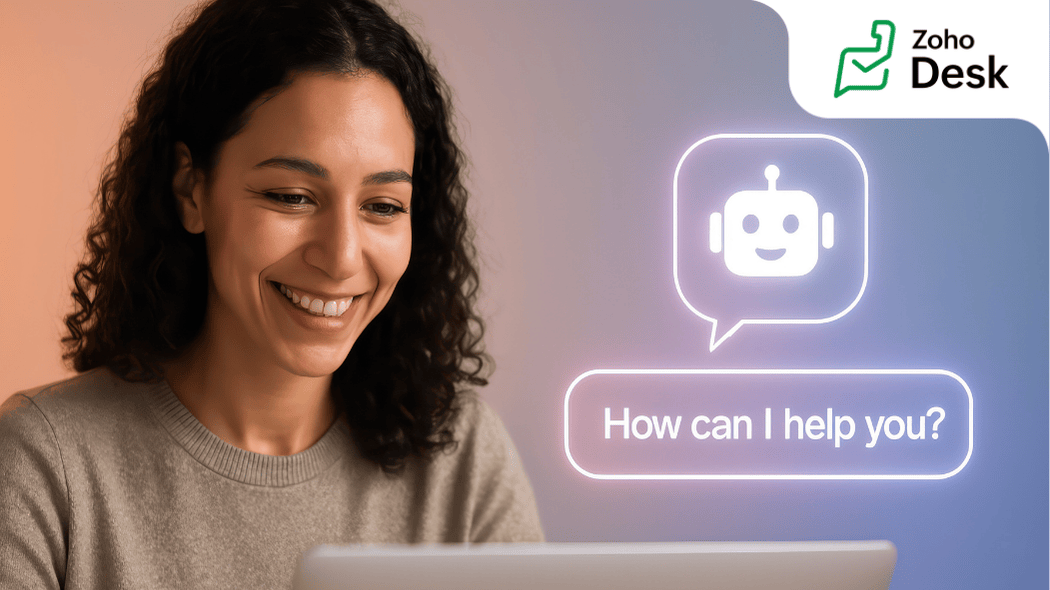- HOME
- Customer Experience
- ChatGPT for customer service: Limitations and capabilities
ChatGPT for customer service: Limitations and capabilities
- Published : April 11, 2023
- Last Updated : April 24, 2024
- 1.3K Views
- 4 Min Read

ChatGPT is a generative artificial intelligence (AI) that can outline blog posts, provide research to bolster your content, generate images, and write codes. Many people are excited about all the possible applications of ChatGPT. But when GPT-4 generated a list of jobs it can potentially replace, it raised some concerns.
It might be alarming to see that customer service representative jobs are second on the list. But it's important to keep in mind that while ChatGPT can sound authoritative, it cannot truly differentiate between fact and fantasy, and it certainly cannot predict the future. The chat window page even alerts users that ChatGPT "may occasionally generate incorrect information," and "may occasionally produce harmful instructions or biased content."
The hype around AI invokes images of robots bent on threatening humankind, blame Westworld, The Matrix, and I, Robot. However, The reality of AI is far less terrifying. It rather has a harmonious relationship with humans, empowering us to do our jobs better.
But can ChatGPT be used in all customer service situations? Let's find out.
What ChatGPT cannot do:
Empathize with the customer
GPT-4 claims it can take over the jobs of customer service reps because it "thinks" it can replace empathy. Many have declared that ChatGPT generates misinformation that sounds convincing, and this certainly seems like an example of that. Although it is programmed to recognize and understand certain phrases that indicate human emotions, it cannot experience emotions in the same way customer service reps (humans) do, so it cannot truly empathize with customers.
Handle complex questions
ChatGPT can provide relevant information from the data it is trained on. But it may not be able to provide comprehensive solutions to complex questions, especially those that require creative problem-solving. Moreover, it cannot understand the context of a conversation, so there always needs to be a human in the loop to handle exceptional customer support cases.
Provide personalized support
Every human should be treated equally but not the same. Humans differ in temperament and opinions, and an AI algorithm might fail to consider that. Although it is possible to integrate ChatGPT with business-specific systems like your help desk or CRM and train it on specific domain knowledge, it doesn't know your customer better than you do and falls short when answers need to be tailored to fit specific customer needs.
Always provide the correct answer
ChatGPT uses a large language model that is continuously trained to improve response accuracy. However, like any artificial intelligence, ChatGPT's responses may contain biases or inaccuracies that may confuse customers. Although ChatGPT generates human-like responses, users must still edit, personalize, and fact-check them.
ChatGPT is more of a companion than a full replacement for its human counterparts. Even with its shortcomings, it has the potential to improve customer service operations significantly when used appropriately.
What ChatGPT can do:
Summarize a thread or a knowledge base article
ChatGPT has excellent summarization skills. It can quickly process lengthy articles or conversations and pull out the most relevant points. This is particularly helpful when an agent has to transfer a ticket to another agent or department. ChatGPT can also help repurpose an existing knowledge base article into step-by-step instructions to share with a customer.
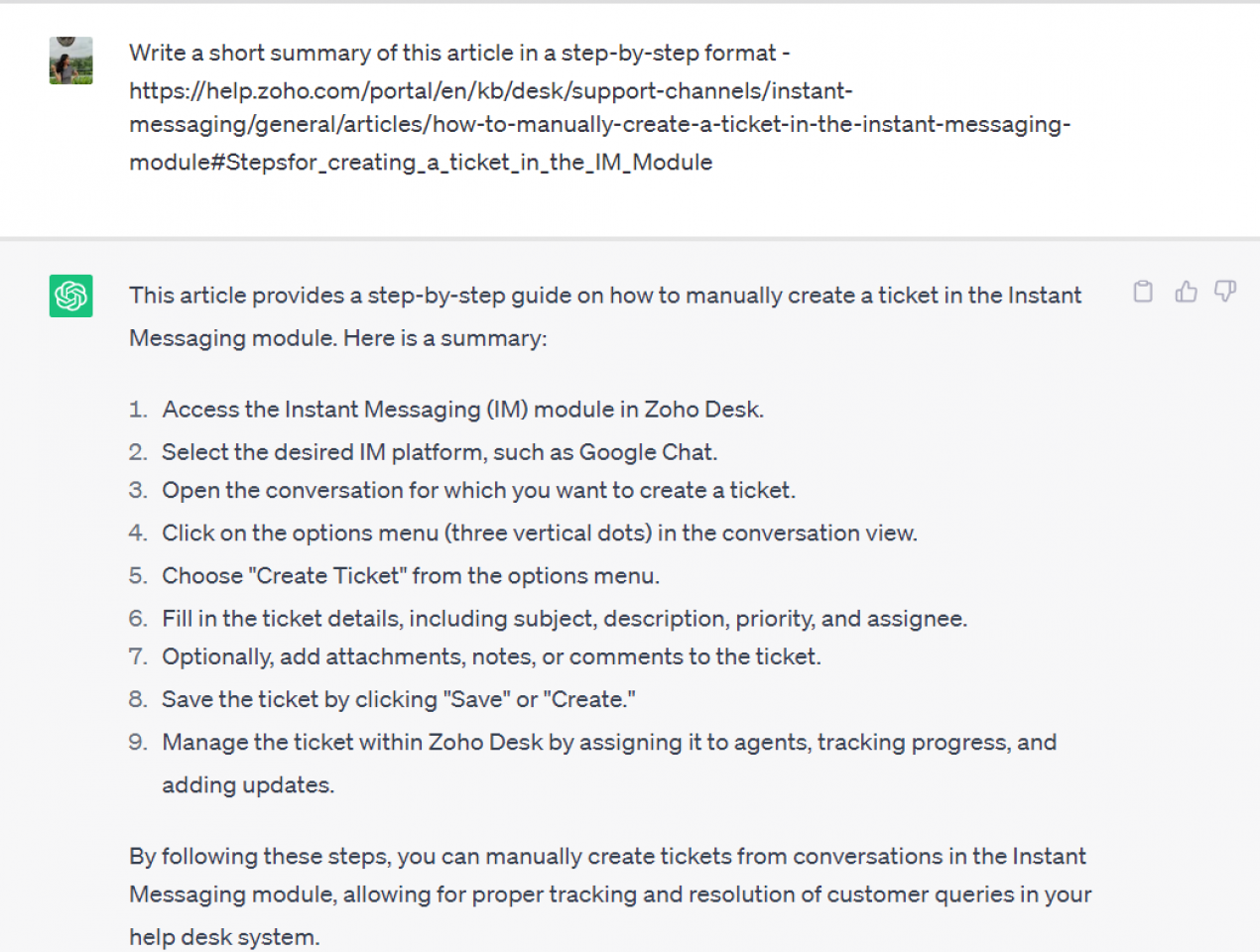
Rephrase agent replies
ChatGPT can generate multiple phrasings of the same text response in a few seconds while retaining the original meaning. Agents can ask ChatGPT to make a message more friendly or formal. It can generate multiple responses, so agents can choose the most desirable option. This helps improve the fluency and tone of the reply.
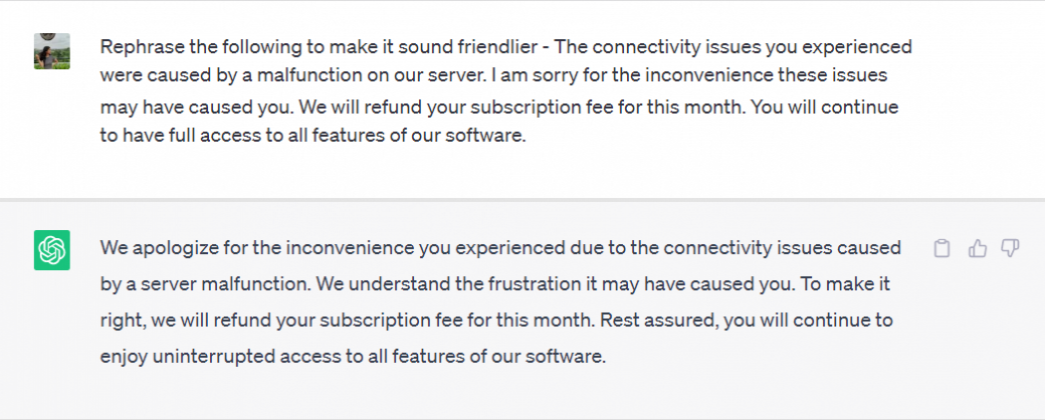
Auto-complete ticket reply
Similar to predictive text on your smartphone, ChatGPT can suggest possible phrases/sentences to complete your response. Support agents generally know the correct answer, so with minor tweaks to what ChatGPT suggests, they can create and type out responses more quickly.
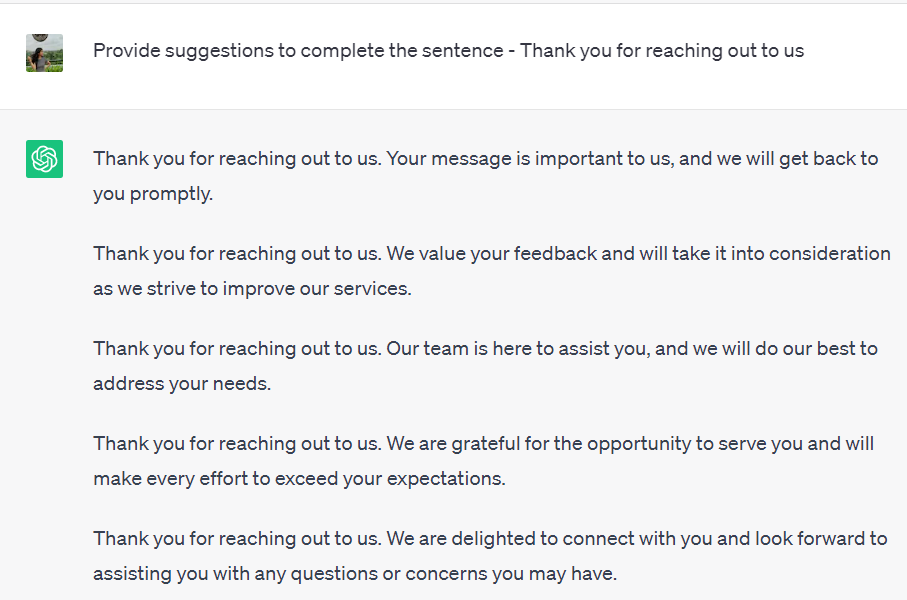
Analyze customer sentiment
As noted earlier, ChatGPT cannot empathize with humans, but it can recognize keywords and phrases that indicate human emotions such as happiness, sadness, and frustration. This skill can be used to sense the tone of an incoming thread and determine the customer's mood. Here's an example of one such use case implemented by Zoho Desk that allows the agents to view the Customer Mood Summary to understand and engage better with the customer.
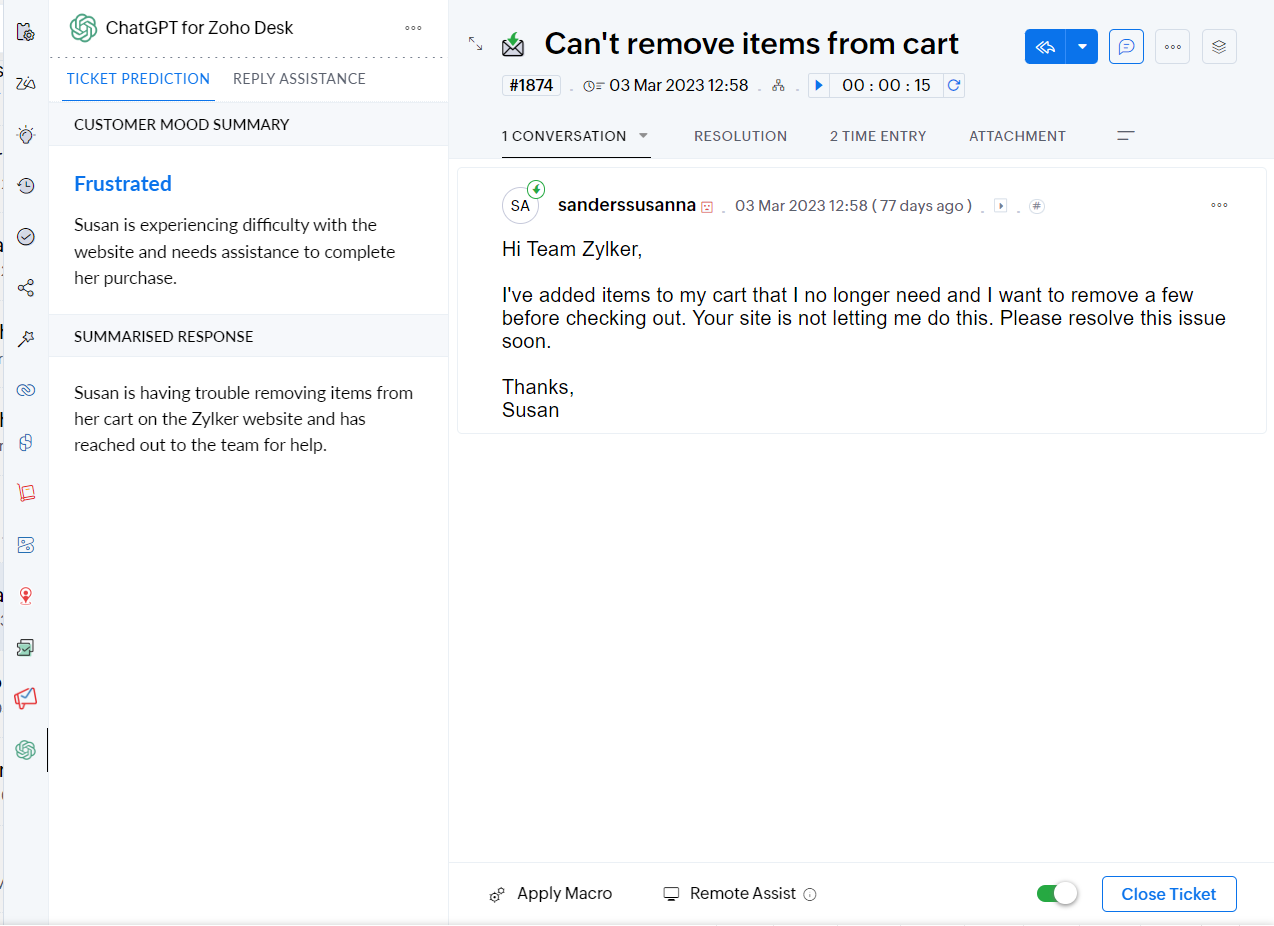
Provide multilingual support
The exact number of languages that ChatGPT supports cannot be determined, as the GPT model continues to update and improve. However, at this time, it already knows quite a few languages. It can translate messages from one language to another in a few seconds. With its multilingual capabilities, ChatGPT can help in providing support to a wider range of customers.
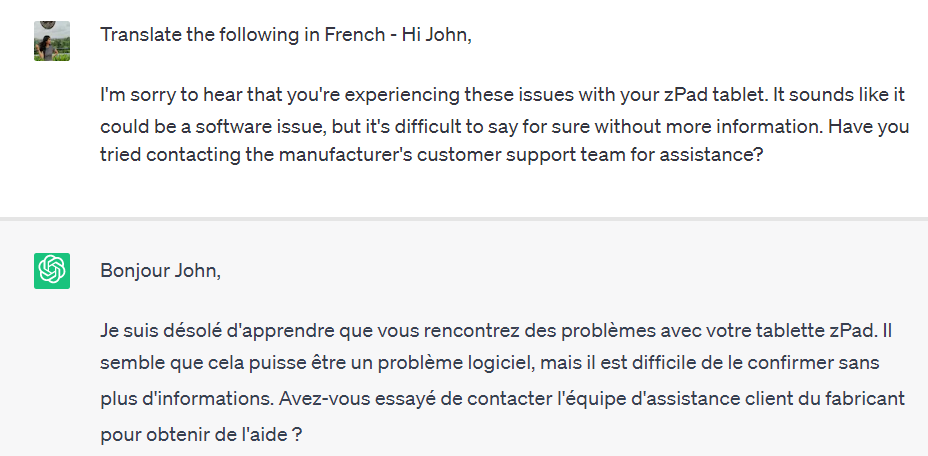
Create templates
Tell ChatGPT what you’re writing—a support email reply to a review, help article, return policy, or something else. ChatGPT can generate templates for all your common communication materials and questions. Then, you can customize the content with relevant product information and other details.
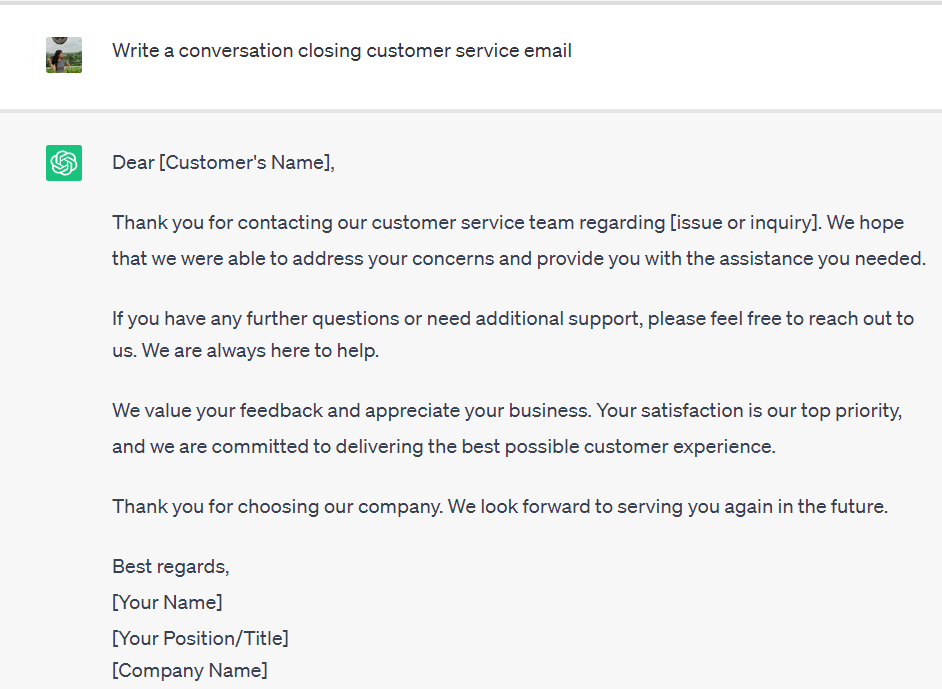
Power business chatbot
You can use OpenAI's API to incorporate ChatGPT into your website or app and use it as a business chatbot to provide around-the-clock support. It can be trained to answer commonly asked questions by surfing the company's knowledge base and performing specific tasks such as booking appointments or placing orders.
Wrapping up!
The workplace is constantly evolving, just as it has been for centuries. People lost their jobs to machines during the Industrial Revolution. But those who embraced the changes became more relevant. Right now we are experiencing an AI revolution.
Humans are — and always will be — fundamental to AI, because AI cannot interpret events, actions, or tones like humans can. A set of computer programs cannot feel like humans, so they don't consider feelings. They fail to understand situational nuances. But the only way to keep up in the modern workplace is to embrace GPT and similar technologies.

